- Home
- James Hankins
The Inside Dark Page 2
The Inside Dark Read online
Page 2
Jason had killed someone. It was a strange feeling. He tried to work up some guilt over it, perhaps a shred of sympathy for the man whose life he had taken, but he felt nothing for Crackerjack, the sadistic serial killer who whistled as he tortured his victims. No, that wasn’t quite true, because he did experience a moment of hatred, pure and intense, for the man who had torn him away from his family and would have killed him eventually had he not died first.
Jason looked over at Ian Cobb, got his first good look at him, and the first thing he noticed was his face. Around each of his eyes was a hand-painted butterfly with delicately filigreed green-and-gold wings. There was glitter in the paint, so the butterflies sparkled as they caught the sunlight filtering down through one of the many holes in the raftered ceiling. Jason couldn’t help but notice the skill in the rendering of the insects. In the drab, run-down stable, the splashes of color were striking . . . but not unexpected—after all, each of Crackerjack’s victims had been found with similar designs. Dead men whose faces had been painted to look like Spider-Man, or a tiger, or Frankenstein’s monster.
Cobb was on his back, his right arm lying awkwardly across his stomach, cradled by his left. He’d been watching Jason stare down at the lifeless body, his expression unreadable, perhaps in part because of the bright butterflies around his eyes. Jason felt uncomfortable, naked and exposed, as though the hot hatred he’d felt toward Crackerjack a moment ago was blazing in red neon on his face. He sucked in a deep breath, blew it out, then nodded toward Cobb’s arm.
“Are you okay?”
“Did you hear him whistling?” Cobb asked. He coughed, which made him wince and grunt in pain. “The son of a bitch was whistling while he did it to me, for God’s sake.”
“I know. Are you all right?”
“I’ve been better, but I’m okay.” He nodded toward the man lying with his head in a puddle of red. “He’s dead, right? He’s definitely dead?”
Jason looked at the blood, the depression in the head, the vacant eyes.
“Yeah, he’s dead.”
Cobb rolled onto his side, then struggled to sit up, grimacing and groaning as he did. He kept supporting his right arm with his left.
“You sure you’re okay?” Jason asked.
“I just want to . . . get away from here.”
Jason looked down at Crackerjack again. What struck him was how ordinary the man would have looked without the crushed skull and dead eyes. If this man passed by on the street, no one would have suspected the darkness raging inside him. Average size, medium build, plain face. Nothing remarkable about him . . . except that he liked to break men to death after painting cheerful designs on their faces, snapping their bones one by one before caving in their skulls with a hammer. And there he lay, killed by hammer blows to the head, possibly delivered with the same tool he’d used to send at least ten other men to their graves. Irony abounded. Payback is a bitch.
Jason gingerly patted the dead man’s pockets, looking for the keys to the manacles on his wrists. No luck.
He turned to Cobb sitting a few feet away. “I need you need to find a key to these chains, okay? Then we can get out of here together. Can you stand?”
Cobb nodded, then labored to his knees, still awkwardly supporting his right arm. Every movement elicited a pained groan expelled through gritted teeth.
“He broke your arm?” Jason asked.
“Maybe some ribs, too.”
“It’s amazing you were able to . . . do what you did . . . escape from him and . . .”
Cobb shrugged.
“You were fortunate,” Jason added.
“Not as fortunate as you,” Cobb replied, smiling weakly.
Jason smiled back, probably even more weakly. He was reminded again of how very tired he was, how depleted his reserves were. “Can you walk?” he asked.
Cobb nodded. “I’ll look for keys.”
He shuffled off. There was nothing for Jason to do but wait. His eyes drifted to the body of the man who used to be Crackerjack, to the ugly, bloody depression he’d made in the man’s head.
Jason had killed him. It had been self-defense, but still . . . he had killed another person.
“Any luck?” he called. His voice was fragile and raspy and he wondered if his words had carried beyond the walls of his corral, but Cobb answered from not too far away.
“No handcuff keys yet, but I found some car keys here in a box on a workbench. Maybe a dozen sets. Cell phones, too, including mine. Some of these things may be yours.”
“Call 911,” Jason rasped.
“I already turned it on . . . waiting for a signal . . . dialing now . . .”
Jason closed his eyes. After what seemed an eternity, Cobb returned, jingling softly as he walked.
“Found these,” he said, dropping a ring of keys beside Jason. “Maybe one of them will do the trick.”
The fourth key opened the iron manacles. God, it felt good to be free of the chains. Now he needed—
“Water,” he said in a dry whisper. “Did you see any water anywhere?”
Cobb shook his head. “Sorry. I should have looked. I know how thirsty you gotta be but I wanted to get you out of those chains.”
“Let’s look now.”
Using the wall for support, he made it to his feet. He tottered for a moment, then shuffled out of the corral that had been his prison for almost five days. He saw that he was in a long building with horse stalls lining both sides. Some still had doors just tall enough to rise to a horse’s chest. Others were missing their doors, like the one in which Jason had been imprisoned, and the one he was passing now . . . inside of which he saw a wooden table, long enough for a man to lie on. Its tan surface was scarred and stained dark brown in several places. Leather straps hung from brackets secured to each of the table’s legs. A smaller table sat near the larger one. Arrayed on its surface were two incongruous sets of items. The first consisted of little jars of paint and delicate brushes while the second featured a small variety of blunt instruments: a wooden mallet with a round head, a mini sledgehammer, a mallet with a square head, a—
Cobb’s voice came from not far away. “Here’s where I found the keys and phones.”
Jason turned away from the stall and, on leaden legs, followed the voice toward the far end of the stable where a big set of doors was set into the stable wall.
Doors. The outside. Freedom.
He found Cobb standing beside a workbench, its surface littered with numerous items, none of which was a bottle of water, the only thing Jason wanted at the moment. He wouldn’t even have minded if it were drugged.
“You okay?” Cobb asked.
“No water here.”
“Maybe they’ll have some with them.”
“They? Who—”
Then he heard them, too. Sirens. He leaned back against the wall, allowed himself to slide slowly to the floor, and waited. While he waited, he started to cry. Apparently, he had enough water in his body for tears after all.
CHAPTER FOUR
Jason opened his eyes and saw white. White everywhere. Hazy, as though he were floating in a cloud. Slowly, he made out shapes. Ceiling tiles, walls, a curtain . . . Then the curtain started to slide into focus and he could make out little blue flowers on it.
At first, he thought he was back in the stable, hallucinating. Then he remembered the escape, and the police, and the ambulance. He smiled weakly. His mouth felt strange. He licked his lips and found them cracked, along with his tongue. He raised his hand to touch his mouth and felt an unfamiliar sensation on his forearm. He looked down and saw an IV line running from a spot near the crook of his arm to a pole beside the bed in which he lay. Movement caught his attention and he turned his head, gritting through a painful stiffness in his neck, and saw a woman standing near the foot of his bed. A nurse in pale-pink surgical scrubs writing on a clipboard. He blinked and his vision became clearer, the clearest it had been in days.
The nurse looked up, saw him watching, and s
miled. Before she could say a word, Jason croaked out one of his own. “Water?”
“I’ll be right back.”
She left, returning a few long minutes later with a cup of ice chips. She spooned a few into his mouth, and the sensation on his cracked tongue and parched throat was wonderful, though the amount she gave him was far, far too small to provide much relief.
“More?” he asked in a dusty voice.
“I’m afraid that’s all for now.” The nurse was short and round and had a kind smile. “You’ll have to take it slow.”
“Just . . . a little?”
“Not yet. Soon, I promise. After the doctor sees you. My name is Maryann, by the way.”
Jason marveled at Maryann’s cruelty.
“My wife?” he whispered. He swallowed, wincing at the discomfort it caused. “Did she call?”
“Ms. Swike did call, and I told her what the doctors told me, that you’re going to be fine.”
He nodded again and watched her leave the room. Just outside the door, a man in a dark suit stopped her. They spoke for a few seconds. Maryann shook her head and walked away. The man in the suit watched him from the doorway until Jason turned his head and closed his eyes.
Dr. Silberman told Jason that he was lucky. He’d suffered moderately severe dehydration but was otherwise in fair health. His initial blood work had shown traces of a benzodiazepine—a drug used to treat anxiety and insomnia. The one that had been in his system was particularly long acting, meaning that its effects had lasted longer than those of many other sleeping aids. Subsequent tests confirmed that his blood was now clear of the drug. His muscles, which had spent days cycling through painful cramps and spasms, would be sore for a day or two, but there would be no long-term ill effects from his time in captivity, at least no physical ones. And Jason had to admit he was starting to feel a bit better. His muscles hurt less already. The ointment they applied regularly to his lips soothed them, and the oral fluids he’d been allowed in moderation did the same for his tongue. He was going to be okay, which was more than—
“What about the other guy?” For a moment, he couldn’t come up with the name. “Cobb?”
“Mr. Cobb suffered a few injuries,” Dr. Silberman said, “but he’ll be fine. You were both lucky, it seems. Especially considering what you went through.”
Silberman listened to Jason’s heart and lungs, checked his eyes with a penlight, wrote a few things on a chart, then told him that he’d be able to leave at the end of the day if he felt up to it. Jason decided that he would definitely feel up to it, even if he didn’t. He wanted to get out of there. He wanted to see Sophie and Max.
No sooner had he closed his eyes than he heard the rumble of a throat clearing nearby. He looked up to see the man in the dark suit standing a few feet from his bed. Six feet tall—maybe six one—and physically fit for a man who looked to be in his late fifties. His eyes were clear and sharp.
“Mr. Swike, I’m Lamar Briggs, a homicide detective with the Essex County State Police.” He flipped open a black wallet, flashing a badge. “Feel up to answering a few questions? There are a lot of people who want to hear what you have to say.”
Jason cleared his throat and said, “I’ll bet. I doubt many people have escaped that guy.”
“You and Mr. Cobb are the only ones we know of.”
Jason nodded but he wasn’t thrilled about having to recount his time in Crackerjack’s stable. He wasn’t certain how much he’d even be able to recall. The only thing he remembered well was beating a man to death, which he doubted he’d ever forget. He could almost feel the bone give way under the hammer in his hand. He could still hear the wet crack as the tool crashed through the man’s skull. He could almost smell the tangy scent of blood, feel its warmth on his cheek. He closed his eyes for a moment, took a small breath, and opened them again.
“What can I tell you, Detective?”
CHAPTER FIVE
Half a dozen news vans were parked in front of Ian Cobb’s house, with two dozen people in and around them, waiting for him to arrive home, evidently hoping for a statement. They were going to be disappointed. They’d already heard from him coming out of the hospital yesterday, and that was enough for Cobb.
He pulled past them into his driveway and they followed on foot toward his house, microphones in hand and cameras on shoulders, shouting questions. He half expected them to duck under the garage door as it descended, but they remained outside.
He was already tired of it all, and it had just begun. He didn’t want to be famous. He just wanted to be left alone. That would happen eventually. Soon enough another killer would come along who would grab the headlines and, thankfully, the attention away from Cobb. But he knew he’d have to put up with his sudden fame for a little while at least.
As on most days, Carolyn, the one who was almost but not quite pretty, was on duty with his father today. And as she did on most days, she appeared downstairs within seconds of Cobb’s arrival home. It seemed to him that the moment she heard movement on the first floor, she left her post in his father’s room upstairs, gathered her things, and hustled down, ready to bid him a quick good night before disappearing out the door. He couldn’t blame her. It must be a long day for her here, stuck in an old man’s room with no one to talk to in any meaningful way. Cobb felt lucky to have her. She was the best of the nurses in the rotation he employed, competent and caring. Like the others, though, she wasn’t cheap. None of it was. The expense of keeping his father at home rather than in a long-term-care facility was significant. The older man’s insurance benefits were too meager to help much, and Cobb’s mother’s life-insurance payout was long gone. Cobb estimated that more than half of his own income went to nursing care, doctors’ visits, and medical supplies and equipment. But it was worth it to Cobb to be able to keep his father close, to see him every day.
He hadn’t even put his wallet and keys on the kitchen counter when Carolyn appeared in the doorway. But this time, rather than issuing a perfunctory report on his father’s never-changing condition before bolting for the front door, she stood there, one hand nervously massaging the other.
“Hello, Mr. Cobb,” she said. “Um . . .”
“Hi, Carolyn. How is he today?”
“Your father? Um . . . the same.”
Of course he was.
“Um . . .”
“Yes?”
“How are you, Mr. Cobb? Are you okay? Uh . . . I heard about you on the news. I mean, who hasn’t? I didn’t see it last night but then the news vans started showing up today, so I turned on the TV and, well . . .”
“I’m a little banged up,” he said, nodding at the cast on his right forearm, “but I’m fine.”
“I can’t imagine what you—”
“I’m okay, I promise. Don’t really feel like talking about it, though. You understand.”
She had been about to say something else but closed her mouth and nodded.
“I’m in for the night,” he added, “so you can head on home.”
“Okay.”
“And Carolyn? Don’t talk to the reporters out there, okay? They’re like pigeons. You feed them, they’ll just keep asking for more. I don’t want my life to become more of a circus than it already looks like it’s gonna be for a while.”
“Sure thing.”
“Thanks. Have a good night.”
At the top of the stairs, Ian walked to the second door on the right, which was open, and entered the room without knocking, as he always did.
Arthur Cobb was right where he’d been the last time Ian had seen him. And the time before that. And the ten thousand times before that. He hadn’t moved a muscle, at least not of his own volition, in eight years; the occasional twitch, nothing more. He was lying in bed, staring at the ceiling. He blinked involuntarily. Tubes ran to and from various parts of his body. One through which he received nutrients and fluids and medicine ran from his arm to an IV pole beside the bed. Two corrugated plastic tubes—one white, the other blue�
��upon which he depended for his life’s breath, were attached to a smaller tube protruding from a surgically made hole in the front of his throat and ran to a ventilator machine in the corner of the room. A trickle of urine flowed down from under the bedcovers through a catheter tube to a collection bag that hung from the bed frame. The bag would need to be emptied soon. Ian frowned. Carolyn should have done that before clocking out for the night.
“Hey, Dad,” Ian said.
His father’s only response was a small whoosh of air, then another—first in, then out—through his tracheal tube. In the corner, the ventilator thumped and clicked and whirred softly in time with the patient’s breathing. Though many people in persistent vegetative states—perhaps even most—are able to breathe on their own, Arthur Cobb had been unfortunate enough to have suffered traumatic injury to his respiratory system in the same accident that caused such devastating damage to his brain, so his days of breathing without mechanical assistance were gone forever.
Ian leaned over his father and looked closely at the site of the tracheotomy. No sign of infection, which was good. Carolyn would often smile and say that Ian’s father just might live forever. The old man’s primary physician, Dr. Howe, said the same thing, though to him, that wasn’t necessarily a good thing. It was good to Ian, though. He wanted his father around for as long as possible.
He sat in the chair near the head of the bed—it was still warm from Carolyn’s recent presence—and regarded his father’s profile. The man’s skin had gone gray long before, having not been touched by direct sunlight in years. He could use a shave soon; the white stubble had been sprouting for nearly a week. Ian would mention it to Carolyn and Rose, though he shouldn’t have to, he thought with irritation.
“Feel like talking a bit, Dad?” He waited a few seconds for an answer that would never come, eyeing the tubes connecting the man to the hissing-humming-clicking machine in the corner. “Not tonight, huh? Okay, I’ll do the talking then.”
He sat back and crossed one leg over the other.

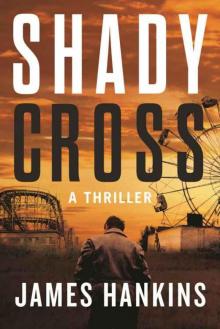 Shady Cross
Shady Cross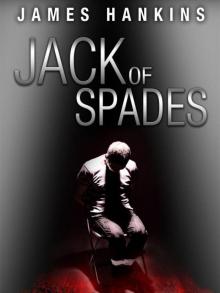 Jack of Spades
Jack of Spades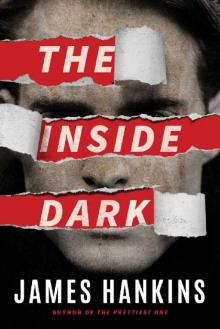 The Inside Dark
The Inside Dark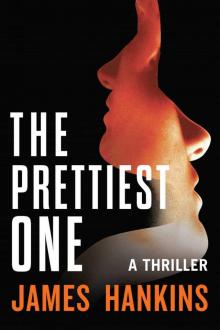 The Prettiest One: A Thriller
The Prettiest One: A Thriller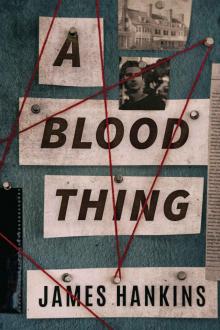 A Blood Thing
A Blood Thing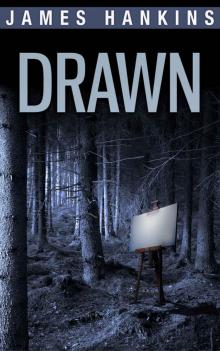 Drawn
Drawn